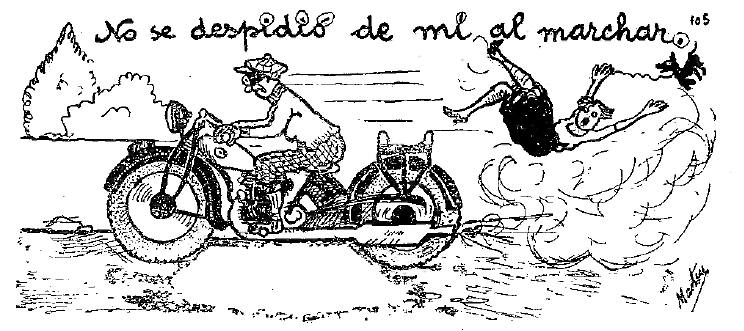|
315 |
Español |
| |
Lección Ciento cinco
(105) |
| |
REVISION AND NOTES |
| |
1 The English gerund : We have seen 2 different
translations of it.
Let's try now to see what shades of meaning they imply.
1° If the gerund answers the question how?, we use the forms in -ando
and -iendo, that in Spanish are called gerund: gerundio.
Ex. : others do themselves well (how?) by eating oysters : otros se
deleitan comiendo ostra?.
— We protect ourselves from the cold (how?) by covering ourselves with
overcoats: and comforters : nos resguardamos del frío abrigándonos con
gabanes y bufandas.
We must not put en before the gerund for we should change the
meaning :
en saliendo does not mean by going out but once gone
out (S. copla at the end of less. 62).
2° If the gerund answers the question when? we translate in by the
Spanish infinitive preceded by al.
— Ex. : I met your friend (when?) on coming out of the theatre ;
encontré a tu amigo al salir del teatro :
he did not take leave of me (when?) on (or when) going away: no se
despidió de mí, al marchar.
This infinitive can be accompanied by a subject :
al empezar la caída de la hoja;
then in most cases we must use a personal tense :
when the fall of leaves begins
(Yet we do say in English : on my father beginning to
speak, I..). |
| |
2 Haber de, tener que.
— These 2 phrases correspond to our : must or to have to
and express obligation.
Haber de is weaker than tener que and is translated merely
by the future :
He de ver eso : I shall (or will) see that
— Hemos de pensarlo, We shall (or will) think of it
— The difference between the two phrases is felt more strongly in
interrogative locutions :
Haber de then implies that one calls one's interlocutor to
witness :
¿Por qué han de silbarla? [Why have they to (must they) hiss her] :
(Tell me) why should they hiss her?)
— ¿Qué hé de hacer? —- What should I do?
— ¿Hemos de enfadarnos por tan poco? Have we to (do you want us to) fall
out for so little? |
| |
3 Expletive personal pronouns me, te, se.
— Spanish uses the current French construction "I wash me (myself) the hands "
(I wash my hands),
not only when parts of the body are concerned, but also when it is a matter of
clothes, adornments worn, or even only things possessed :
Se puso la chaqueta: "he donned him(self) the jacket", he put on his jacket
-— Nos quitamos el sombrero ; "we doff us (ourselves) the hat", we take off our
hats).
-— Se jugó toda la herencia, "he gambled him(self) all the inheritance" : he
gambled all his inheritance.
Reflexive pronouns are also used with the verbs comer, beber, tragar (to
swallow), but only when they are followed by an object expressing the
precise quantity of the thing absorbed.
¿Ya te comerás una docena de ostras? — You will eat (for yourself) a dozen
oysters, won't you?
— Se bebió dos vasos de aguardiente : he drank (for himself) 2 glasses of
brandy.
— Se tragó todos los huesos : he swallowed (for himself) all the stones, (bones)
.
But we shall say, without any expletive pronoun :
Comemos a las doce, we eat at midday.
— No bebo más que agua : I drink only water.
-— No puedo tragar la sidra, I can't swallow cider. |
| |
4 The adverb ya. — Its primitive meaning is : already
:
¿Ya acabaste? You have already finished?
— Mi hermano llegó ya : my brother has already arrived.
Sometimes it merely reinforces an affirmation, and corresponds to the emphatic
form :
ya sabes : you do know; ya lo veo : I do see it; ya veremos; we will see.
Used with a negation, is corresponds to : no more, no longer :
ya no sé : I know no longer.
Esta no vuelve ya : this one comes back no more.
Ya nadie me conoce : nobody knows me any longer.
Repeated before two terms, it means : either... or..., or ; now... now.
Todos los días tenemos pescado, ya de río, ya de mar ; every day we have fish,
either (of) river, or (of) sea.
— Oíanse los truenos, ya lejanos y sordos, ya cercanos y estrepitosos : [They
heard] the thunderclaps were to be heard, now distant and low, now near and
noisy.
Now... now... can he rendered also by : unas veces... otras veces...
(= at times...) :
Unas veces me reñía, otras veces me halagaba : sometimes he would scold me,
sometimes he would flatter me. |
| |
5 The tú, imperative (2nd pers. singular).
-— It is, as we have already seen, very simple, and is characterized by a final
a for verbs in AR and e for verbs in ER and IR.
Habla : speak; bebe : drink; abre la puerta : open the door.
You will recognize and easily remember the only irregular forms ; ve, ven, ten,
pon, sal, di, haz (cf. less. 96, exerc).
When you speak in the plural imperative to several persons to each of whom
separately you say tú, it is still easier :
you change the r of the infinitive into d :
hablad (hablar) más alto : speak louder;
bebed (beber) despacio, drink slowly;
abrid (abrir) la puerta ; open the door;
sed (ser) buenos, hijos míos; be good, my children (There are no
irregularities)-
When we say : venga usted, tome usted, vaya usted, we use in fact the forms of
the subjunctive, not of the imperative :
let his Honour come, take, go, etc...
And we must come back to these forms, when our tú-imperative
(sing.) is negative, only adding the s, characteristic of the 2nd person.
Thus : toma : take, and : no tomes, don't take (compare with : no tome usted) ;
dime, tell me, and : no me digas nada, tell me nothing (cf. no me diga Vd. nada)
;
corred, run, and no corráis : don't run. |
| |
|
|
|
6 El otoño. — Ya se van acortando los días, y
aflojando el calor.
Se hace la recolección de las frutas maduras : nueces (una nuez), castañas,
avellanas, higos nísperos, naranjas, limones, etc.
Pero es principalmente la época de la vendimia y con la uva prensada en los
lagares se hace el vino.
En el campo, los labradores aran la tierra para sembrar el trigo.
Los cazadores persiguen la liebre, la codorniz, la perdiz, la becada, o acechan
por el monte la paloma torcaz.
Óyense a cada rato tiros de escopeta.
Al amanecer hay rocío por los prados y a menudo alguna neblina a lo largo de los
ríos. |
| |
Autumn. — Already, the days grow shorter [go shortening], and the
heat diminishes [goes yielding].
They [make the] gather[ing] of ripe fruit : walnuts, chestnuts, hazel-nuts,
figs, medlars, oranges, lemons, etc.
But it is chiefly the time of the grape-gathering, and with the grapes crushed
in the (wine-)presses, the wine is made.
In the country, the ploughmen plough the earth to sow the corn.
The sportsmen chase the hare, quail, partridge, woodcock or stalk the ring-dove
in the wooded places.
They [you] hear at each moment gun reports.
At daybreak there is dew in the fields and often some mist along the rivers. |
| |
La vid : the vine (plant);
una viña, a vineyard.
Perseguir, persigo, Vd. persigue, perseguimos, like pedir.
— El monte often means, not the mountain, but wooded places.
Desmontar : to clear of trees. |


